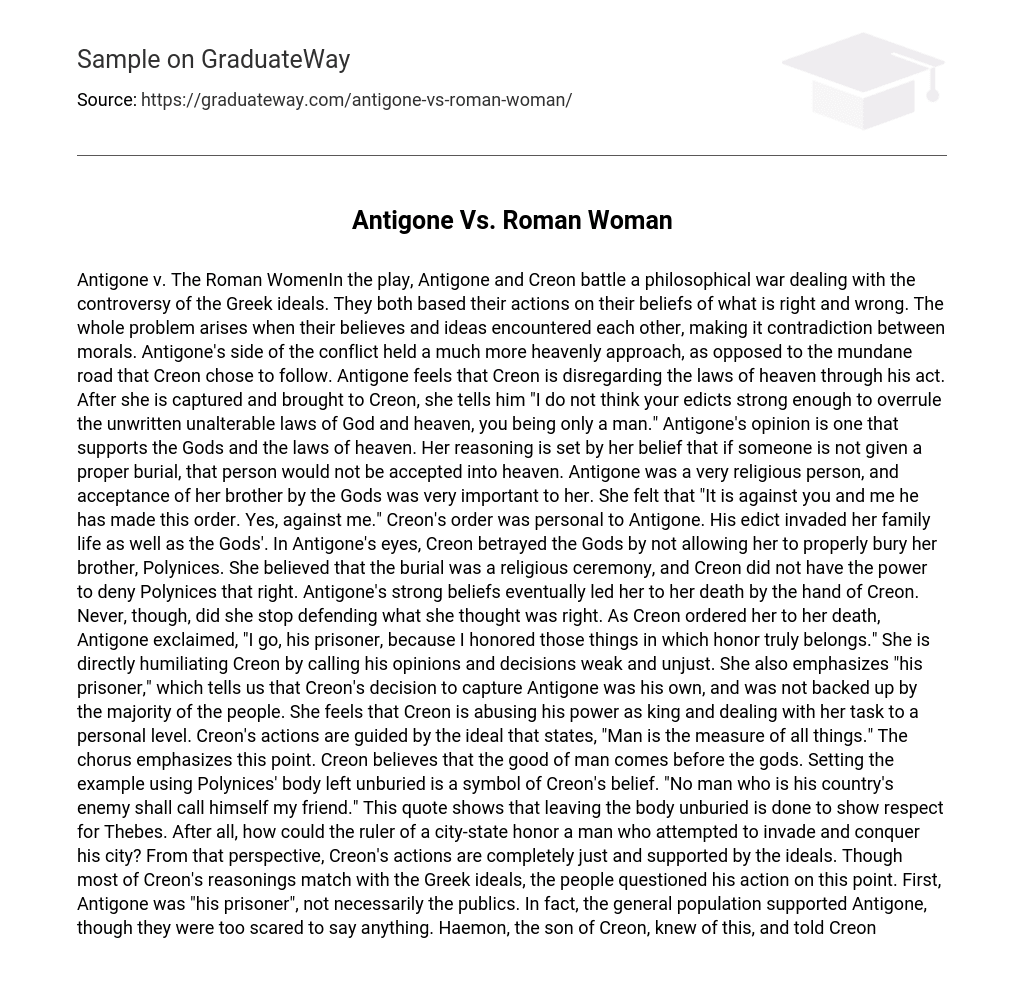Antigone and the Roman Women engage in a philosophical conflict regarding the controversy of Greek ideals. Each character’s actions are guided by their own moral beliefs. However, when their beliefs clash, a contradiction arises. Antigone takes a more celestial approach, while Creon opts for a more worldly path.
Antigone believes that Creon’s actions disregard the laws of heaven. When she is captured and brought before Creon, she expresses her belief that his edicts are not strong enough to override the unwritten and unalterable laws of God and heaven, as he is merely a man. Antigone’s viewpoint aligns with the Gods and the laws of heaven. Her reasoning is rooted in her belief that if someone is denied a proper burial, they will be rejected by heaven. Antigone strongly holds her religious faith, and the Gods accepting her brother is of utmost importance to her. She perceives that this order is against both Creon and herself.
Creon’s order was personal to Antigone as it invaded her family life and violated the Gods’ law. Creon’s refusal to allow her to properly bury her brother, Polynices, was seen by Antigone as a betrayal of the Gods. She believed that the burial held religious significance and that Creon had no authority to deny Polynices that right. Despite the consequences, Antigone unwaveringly stood up for her beliefs, defending what she deemed to be right, until her tragic demise at the hands of Creon.
Antigone, in response to Creon’s order for her execution, declares that she is going willingly because she respected what truly deserves honor. By saying this, she openly humiliates Creon, implying that his opinions and decisions are feeble and unjust. Furthermore, Antigone emphasizes her status as “his prisoner,” implying that Creon’s decision to capture her was his own, without the backing of the majority. She believes that Creon is misusing his power as king and approaching her punishment on a personal level. The chorus highlights this ideal by stating that Creon’s actions are influenced by the belief that “Man is the measure of all things.”
Creon’s belief is that the good of man takes precedence over the gods, and he uses the act of leaving Polynices’ body unburied as an illustration of this belief. By leaving the body untouched, Creon intends to demonstrate his respect for Thebes, as exemplified by the quote, “No man who is his country’s enemy shall call himself my friend.” By refusing to honor a man who tried to invade and conquer his city, Creon believes he is acting justly and in accordance with Greek ideals. However, the people voice their doubts and question his decision on this particular matter.
Antigone was held captive by Creon, not necessarily by the public. However, despite their fear, the general population actually supported Antigone. Haemon, Creon’s son, informed him of this, stating, “Has she not rather earned a crown of gold? Such is the secret talk of the town.” This demonstrates Creon’s absolute control over political power, which goes against the new ideals. Additionally, prohibiting Antigone from performing her religious burial ceremony interferes with religious matters and violates her religious freedom.
Throughout the play, the beliefs of Creon and Antigone clash, creating strong contradictions. Their arguments are well-structured, but neither is able to fully overpower the other. This leads to ongoing debate about who the true hero of the play is. Antigone is driven by her deep religious convictions, while Creon seeks to benefit his city-state. Ultimately, the opinion of the chorus becomes decisive, convincing Creon to release Antigone.
The text highlights the contrasting views on women’s rights in Greek and Roman society. In Greece, influential women had the opportunity to participate in legal matters and express their opinions. This is evident in Creon’s careful consideration of various factors before making decisions, as demonstrated in his decision-making process. The scene illustrates Antigone’s protest against the king’s refusal to grant burial rights for her deceased brother and her defiance by giving him a proper burial despite his direct decree. Such acts of disobedience were uncommon for women during that era, as they were expected to obey their patriarchal ruler’s commands. Conversely, Roman society believed that women should always be under the authority of their fathers, brothers, and husbands. Irrespective of social status, women were always required to submit to men in some capacity.
The expectations for women differ between societies. In Greek society, a good woman is expected to be chaste, dutiful, and submissive while also upholding the truths of the gods and Roman morals. However, in Antigone, we observe how women prioritize their loyalty to the gods above any man, which was not common in Rome. The main distinction between these cultures lies in the fact that Greeks valued women’s opinions whereas Romans completely disregarded them. Politics excluded women in both societies; nevertheless, in Rome, women were solely appreciated for their reproductive abilities.





